It’s a great year for noir, which this list will showcase; there’s also an elegant classical mystery, a speculative mapmaking adventure, and several works that straddle the line between psychological thriller and literary fiction. I won’t say that any of these works transcend the genre—rather, they are a perfect expression of it, both embracing and exploding tropes, playing with our expectations and fulfilling our needs. It’s a tough year so far, and perhaps a clear-eyed vision of our struggles and strengths is something crime fiction can best provide. I’ve always hated feeling lied to, and crime novels have all the honesty you can take about this world (plus a little more). The characters in these books are flawed, but they won’t ignore the suffering around them—and that’s a lesson we can all take to heart.
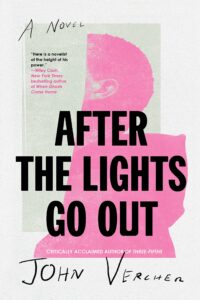 John Vercher, After the Lights Go Out
John Vercher, After the Lights Go Out
(Soho)
There’s a joke about booksellers that this (former) bookseller happens to agree with: when asked for a good beach read recommendation, a bookseller will nearly always recommend something absolutely devastating and emotionally brutal. By that metric, for this book is guaranteed to make you sob, After the Lights Go Out is truly the perfect beach read. A biracial MMA fighter caring for his father with Alzheimers starts to wonder if his own mind is also starting to go after suffering repeated traumatic brain injuries in the cage. He’s about to start fighting again after a short-term ban for steroids, and his cousin has an epic fight lined up to get him back in the game. This is a stunning book about loving that which is destroying you. Also, if you are worried, the dog does not die. I repeat, the dog does not die. –Molly Odintz, CrimeReads senior editor
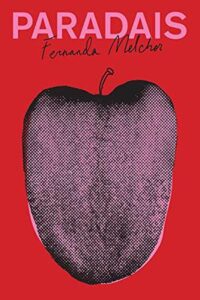
Fernanda Melchor, Paradais
Translated by Sophie Hughes
(New Directions)
Fernanda Melchor’s Paradais is brutal poetry, distilled. It’s also a visceral examination of classism, fatphobia, and most of all misogyny. In a luxury apartment complex, two boys on the cusp of manhood while away a long summer drinking together. Franco Andrade, a resident of the complex who lives with his grandparents but is ostracized by the rest of the community, is overweight, undersocialized, and sexually obsessed with his neighbor; he steals liquor from his family and shares it with Polo, the teenage gardener of the complex, who yearns to join the cartels and make something of himself instead of wasting his youth trimming grass for rich people. Franco has a fantasy that becomes more and more like a plan: he’s going to break into his neighbor’s home and force himself on the object of his desires. Polo’s pissed off, drunk, and just angry enough to help Franco out. Like other works out this summer, including Liska Jacobs’ brilliant The Pink Hotel, Paradais warns against considering any luxurious abode as “safe” when the mere existence of such enclaves intensifies the inequalities that will eventually lead to their own demise. –MO
 Barbara Bourland, The Force of Such Beauty
Barbara Bourland, The Force of Such Beauty
(Dutton)
This is a fascinating novel about bodies, the way we use them, and the way we break them. It’s one of several works to come out this year concerned with the appropriation of female beauty by powerful men, and examines a harsh choice in the lives of women dubbed desirable by the patriarchal state: do you participate, or do you say no? But let’s backtrack here: what’s this book actually about? It’s about an olympic athlete failed by the same body that propelled her to success, who finds herself falling in love with the heir apparent of a small kingdom suspiciously similar to Monaco or Luxembourg, then falling under the sway of his powerful mother and ministers. She soon realizes her new life is just as regimented, and affords just as few choices, as her time training as an elite runner. Barbara Bourland is skilled at finding the noir in the everyday, and illustrating the mechanisms of control that keep us in our place. –MO
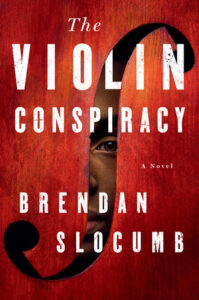
Brendan Slocumb, The Violin Conspiracy
(Anchor)
What an absolutely perfect mystery The Violin Conspiracy is, and one that reaches deep into the history of race and inequality in America in its investigation of a seemingly simple crime. A classical violinist – often the only Black musician included in elite musical ensembles – finds out that his own violin, a family heirloom, is a rare Stradivarius once gifted to his ancestor by a slave owner. After discovering the violin’s now-astronomical worth, the descendants of the slave-owning family decide to sue the violinist to recover “their” property. Meanwhile, the violin itself is stolen, and it’s up to the musician to both prove his ownership and recover the stolen instrument. The ending will shock you. But perhaps the ending shouldn’t be so surprising, given the lengths to which white supremacy will go to justify pre-existing inequalities or secure a place at the top. –MO
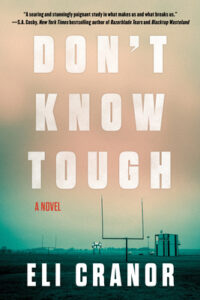
Eli Cranor, Don’t Know Tough
(Soho)
Cranor’s debut novel is one of the most powerful noirs to come along in years, a finely chiseled slice of upended Americana and a deeply felt study in the ties that bind us and tear us apart. Small-town Arkansas football is the setting, so you know the stakes are going to be high, but Cranor brings to his story so many moments of quiet, cutting grace. The dread is allowed to subtly build in the background, until quite suddenly you’re drowning it. The story is built with rugged, overlapping fabrics: the outsider coach, the hard case player with talent and demons, the town and its yearning to win, with all the violence and heartache that implies—all these human moments come together in sensational fashion to yield a story that’s genuinely shocking, told in language that’s rich, compelling, and finely wrought. Cranor shows himself to be a craftsman of the highest order, and an author whose stories we’re going to be anticipating for years to come. –Dwyer Murphy, CrimeReads editor-in-chief
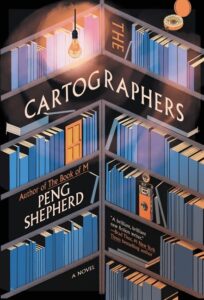
Peng Shepherd, The Cartographers
(William Morrow)
What could be more mysterious than a town that exists on a map but not in real life? That’s what’s called a “paper town”—a mapmaking term for a fake place created as a copyright trap to spot if others are replicating one’s own work without doing the research. In The Cartographers, mapmaker Nell Young takes on an impossible crime: investigating the locked-room murder of her estranged father. As she digs into the case, she learns that her father’s death is tied to the long-ago fire that killed her mother, and must venture into semi-supernatural territory in order to understand the full implications of what her parents once worked on. –MO
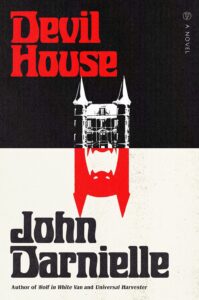
John Darnielle, Devil House
(MCD)
Darnielle’s Devil House is a novel full of odd and unexpected patterns: a man supposedly descended from royalty, now making his living as a true crime writer, forced to double back on his past, going through the motions of old work, but in a new setting with familiar tinges: a small-town in California, a house that was the site of a gruesome murder, and notes of the Satanic Panic that swept certain corners of the popular culture in the 1980s. The book’s overwhelming sensation is one of dizziness and vague recognition, like the very best of Hitchcock’s films, with something terrifying and irrepressible always lurking up ahead, just out of sight. And like Hitchcock, Darnielle brings a sophistication to his work, so that the characters’ own sentiments and conceptions are always being questioned and challenged. The result is a funhouse novel where the horrors and insights surround us and seem always to be closing in. –DM
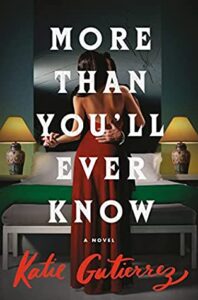 Katie Gutierrez, More Than You’ll Ever Know
Katie Gutierrez, More Than You’ll Ever Know
(William Morrow)
This book is full of so much love. Lore Rivera has everything a woman is told to want: a husband who loves her, two children who work hard to succeed, and a career that values her. When her husband’s business falls prey to a recession, she finds herself suppressing her own success to make her husband feel better. Meanwhile, she meets another man in Mexico City who finds her success a turn-on. Soon enough, she’s got two husbands; soon after that, one husband finds out and kills the other. Forty years after, a true crime journalist becomes obsessed with the case and gets Lore to finally agree to an interview baring all. A fascinating meditation on love, career, and family that’s also a stunning page-turner. –MO
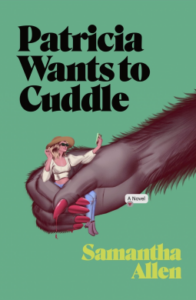 Samantha Allen, Patricia Wants to Cuddle
Samantha Allen, Patricia Wants to Cuddle
(Zando)
Samantha Allen (Real Queer America) wrote for Lit Hub recently about the direct line between slasher films and elimination-style reality TV, and she brings those genres together in her debut novel, Patricia Wants to Cuddle. On a creepy island in the Pacific Northwest, four “Final Girls” competing for love on The Catch discover the stakes are infinitely higher than expected. –Eliza Smith, Lit Hub special projects editor
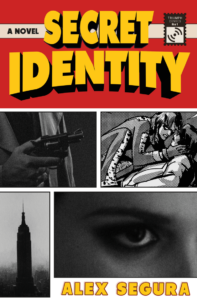
Alex Segura, Secret Identity
(Flatiron)
Alex Segura’s newest novel is a marvel of atmospherics, a vividly imagined glimpse into the world of 1970s comic books in New York City and the mean streets that ran between the office buildings and kept a subculture pumping away. At the story’s heart is a fierce protagonist, Carmen Valdez, who longs to tell her stories with superheroes and is determined not to be pushed aside. When a colleague is killed—and her own participation in an important work is erased—Carmen is forced into the sleuth mode, and the story becomes a clever reinvention of 1970s private eye fiction. The set pieces are intricate and thrilling and the backdrop is lovingly rendered. Secret Identity feels like the novel Segura was born to write. His love of both noir and comics shines through and makes this book one of the most enjoyable, rewarding reads of the year. –DM
Notable Selections:
Kellye Garrett, Like a Sister (Mulholland) · Sebastian J. Plata, Seeing Strangers (Agora) · Rachel Howzell Hall, We Lie Here (Thomas and Mercer) · Chris Bohjalian, The Lioness (Doubleday) · Adrian McKinty, The Island (Little Brown) · Lisa Lutz, The Accomplice (Ballantine) · Marie Rutkoski, Real Easy (Henry Holt) · Calla Henkel, Other People’s Clothes (Doubleday) · Bethany C. Morrow, Cherish Farrah (Dutton) · Grace D. Li, Portrait of a Thief (Tiny Reparations) · Tara Isabella Burton, The World Cannot Give (Simon & Schuster) · Don Winslow, City on Fire (William Morrow) · Gary Philips, One Shot Harry (Soho) · Gigi Pandian, Under Lock and Skeleton Key (Minotaur) · María Gainza, Portrait of an Unknown Lady, Translated by Thomas Bunstead (Catapult) · Isabel Cañas, The Hacienda (Berkley) · Jennifer Hillier, Things We Do In The Dark (Minotaur) · Danya Kukafka, Notes on an Execution (William Morrow) · Robyn Gigl, Survivor’s Guilt (Kensington) · Paul Vidich, The Matchmaker (Pegasus) · Rob Hart, The Paradox Hotel (Ballantine) · Mia P. Manansala, Homicide and Halo-Halo (Berkley) · Silvia Moreno-Garcia, The Daughter of Doctor Moreau (Del Rey) · Moses McKenzie, Olive Grove in Ends (Little Brown) · Dan Fesperman, Winter Work (Knopf) · Alma Katsu, The Fervor (Putnam) · Blitz Bazawule, The Scent of Burnt Flowers (Ballantine Books) · Candace Wuehle, Monarch (Soft Skull) · Kirsten Miller, The Change (William Morrow) · Elizabeth Day, Magpie (Simon & Schuster) · Javier Cercas, Even the Darkest Night, translated by Ann McLean (Knopf) · Ruth Ware, The It Girl (Gallery/Scout) · Dervla McTiernan, The Murder Rule (William Morrow) · Louise Welsh, The Second Cut (Canongate) · Chris Offutt, Shifty’s Boys (Grove) · Paraic O’Donnell, The Maker of Swans (Tin House) · Anna Pitoniak, Our American Friend (Simon & Schuster) · Margarita Montemore, Acts of Violet (Flatiron) · Richard O’Rawe, Goering’s Gold (Melville House) ·

















